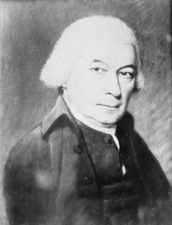John Sloss Hobart
| John Sloss Hobart | |
|---|---|
 |
|
| Judge of the United States District Court for the District of New York | |
|
In office April 12, 1798 – February 4, 1805 |
|
| Appointed by | John Adams |
| Preceded by | Robert Troup |
| Succeeded by | Matthias B. Tallmadge |
|
United States Senator from New York |
|
|
In office January 11, 1798 – April 16, 1798 |
|
| Preceded by | Philip Schuyler |
| Succeeded by | William North |
| Personal details | |
| Born |
May 6, 1738 Fairfield, Connecticut |
| Died | February 4, 1805 (aged 66) New York City, New York |
| Political party | Federalist |
| Spouse(s) | Mary Greenill |
John Sloss Hobart (May 6, 1738 – February 4, 1805) was an American jurist and politician. He was a member of the Federalist Party who served as United States Senator from New York, and later as a United States federal judge.
Born in Fairfield, Connecticut to Noah Hobart and Ellen Sloss, Hobart graduated from Yale College in 1757 where he studied law. He was admitted to the bar and commenced practice in New York. On June 22, 1764 he married Mary Greenill, they had no children.
Hobart was member of the Committee of Correspondence in 1774. He was a Deputy to the Provincial Convention of New York in 1775, was also a delegate to the Provincial Congress from 1775 to 1777, and was a member of the council of safety in 1777. He was a Puisne Justice of the Supreme Court of the State of New York from 1777 to 1798, member of the Hartford convention in 1780, and member of the State convention in 1788 which ratified the United States Constitution.
Hobart was elected to the United States Senate as a Federalist to fill the vacancy caused by Philip Schuyler's resignation for health reasons, serving from January 11, 1798 to April 16, 1798, until his own resignation to accept an appointment to the federal court system. He was nominated to the federal bench by John Adams on April 11, 1798, to a seat on the United States District Court for the District of New York vacated by Robert Troup. Hobart was confirmed by the Senate on April 12, 1798, and received his commission the same day. He served on the bench until his death.
...
Wikipedia
